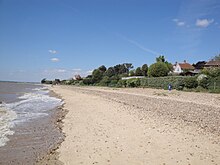Mersea Island /ˈmɜːrzi/ is an island in Essex, England, in the Blackwater and Colne estuaries to the south-east of Colchester. Its name comes from the Old English word meresig, meaning "island of the pool" and thus is tautological. The island is split into two main areas, West Mersea and East Mersea, and connected to the mainland by the Strood, a causeway that can flood at high tide.
The island has been inhabited since pre-Roman times. It was used as a holiday destination in Roman Britain for occupants of Camulodunum (Colchester). Fishing has been a key industry on the island since then, particularly oysters, and along with tourism makes up a significant part of the island's economy. The Church of St Peter & St Paul in West Mersea is thought to have existed since the 7th century, while the Church of St Edmund in East Mersea dates from around the 12th or 13th century. The island became popular with smugglers from the 16th to the 19th century. It became a focal point for troops in both world wars, and a number of observation posts can still be found on the island. Tourism remains popular, and there are a number of beach huts and holiday parks on the island. A week-long festival of boat racing, Mersea Week, takes place every summer. (Full article...)
